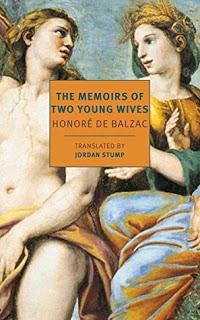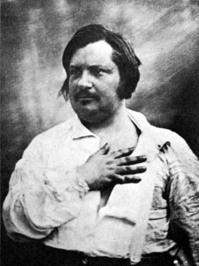
ABOUT THE BOOK:
Two very intelligent, very idealistic young women leave the convent school where they became the fastest of friends to return to their families and embark on their new lives. For Renée de Maucombe, this means an arranged marriage with a country gentleman of Provence, a fine if slightly dull man for whom she feels admiration but nothing more. Meanwhile, Louise de Chaulieu makes for her family’s house in Paris, intent on enjoying her freedom to the fullest: glittering balls, the opera, and above all, she devoutly hopes, the torments and ecstasies of true love and passion. What will come of these two very different lives?
Despite Balzac’s title, these aren’t memoirs; rather, this is an epistolary novel. For some ten years, these two will—enthusiastically if not always faithfully—keep up their correspondence, obeying their vow to tell each other every tiny detail of their strange new lives, comparing their destinies, defending and sometimes bemoaning their choices, detailing the many changes, personal and social, that they undergo. As Balzac writes, “Renée is reason. . . Louise is wildness. . . and both will lose.” Balzac being Balzac, he seems to argue for the virtues of one of these lives over the other; but Balzac being Balzac, that argument remains profoundly ambiguous: “I would,” he once wrote, “rather be killed by Louise than live a long life with Renée.”
MY REVIEW:
 The Memoirs of Two Young Wives by Honoré de Balzac
The Memoirs of Two Young Wives by Honoré de BalzacMy rating: 4 of 5 stars
The Memoirs of Two Young Wives by Honoré de Balzac, (Jordan Stump translator) is a 2018 NYRB Classics publication. This book was originally published under the title Mémoires de deux jeunes mariées in 1841.
When NYRB Classics sent out an email announcing the release of this classic epistolary novel, which is not, as the title suggests, a memoir, I was intrigued enough to request a purchase of it for my Overdrive library, which they were kind enough to do.
What an interesting story! Told strictly via letters exchanged between two friends who met while attending a convent school together. They remained friends, throughout their entire lives, despite the very vast differences in the paths their lives took in adulthood.
Renee chose a traditional life, marrying for comfort and companionship, to boost her husband’s morale and confidence, and for the pleasure of motherhood. Although she loves her husband in a way, theirs is not an all consuming love affair.
Louise, lives for love, passion, society, and glamour. She is not in any way tempted by domesticity, nor does she display the slightest maternal instinct. She loves passionately, takes risks, attends social galas, and seems to love every minute of her dramatic life. But, she may pay a heavy toll for her choices.
While each wife regales the other with their ups and downs, heartaches, trials, and triumphs, often urging each other to accept or acknowledge the benefits of the life they have chosen.
The reader will see both sides clearly, and will, without much nudging from the author, decide which wife has made the best choice. Will they come to regret those decisions? Are they secretly envious of each other in big or small ways? Wistful perhaps? Which life would you choose to lead? Renee's or Louise's?
This is a variant on the ‘coming of age’ trope, and while the story is tragic, what really stands out is the bond between Renee and Louise. They often disagree, go through long periods without correspondence, but love each other, despite the obvious chasms between them.
I love my books, and really, really get involved with them on occasion, prompting me to do Google searches or ‘further reading’ if a topic interests me. In this case, I was a little afraid I might be completely out of my element, so I did a little research, and discovered some interesting facts about the book and the author, which was very helpful since I don’t ordinarily read French novels, although it seems I may be the only person on the planet unfamiliar with Balzac.
Originally, this French language epistolary, was serialized in a French newspaper. It was first translated in 1902.
It has been noted that the author did an amazing job of giving these women a voice, writing from the female perspective, with acute sensitivity for a man. He provided social commentary throughout and touched on the various forms of love, romance and marriage.
It is my understanding that compared to Balzac’s most famous work, this one barely made a blip when first published, but now, after taking it out and dusting off, it seems to be a rare and poignant discovery, even if it is not exactly what those familiar with his work are accustomed to.
As for me, with nothing else to compare it to, I was thrilled to discover this ‘lost’ classic and happy to see that is now in digital format.
It is a unique epistolary book, I am happy I took the time and extra effort to obtain. Needless to say, this has been an interesting, and pleasant learning experience for me. Although the story does end on a rather somber note, it does provoke thought and did indeed have me thinking about these two women, both of whom lived life on their own terms, for better or worse.
4 stars
GET YOUR COPY HERE:
https://www.amazon.com/Memoirs-Young-Wives-Review-Classics/dp/1681371251/
https://www.barnesandnoble.com/w/memoirs-of-two-young-wives-honor-de-balzac/1101562375
ABOUT THE AUTHOR:

Honoré de Balzac was a nineteenth-century French novelist and playwright. His magnum opus was a sequence of almost 100 novels and plays collectively entitled La Comédie humaine, which presents a panorama of French life in the years after the fall of Napoléon Bonaparte in 1815.
Due to his keen observation of detail and unfiltered representation of society, Balzac is regarded as one of the founders of realism in European literature. He is renowned for his multi-faceted characters; even his lesser characters are complex, morally ambiguous and fully human. Inanimate objects are imbued with character as well; the city of Paris, a backdrop for much of his writing, takes on many human qualities. His writing influenced many famous authors, including the novelists Marcel Proust, Émile Zola, Charles Dickens, Gustave Flaubert, Henry James and Jack Kerouac, as well as important philosophers such as Friedrich Engels. Many of Balzac's works have been made into films, and they continue to inspire other writers.
An enthusiastic reader and independent thinker as a child, Balzac had trouble adapting himself to the teaching style of his grammar school. His willful nature caused trouble throughout his life, and frustrated his ambitions to succeed in the world of business. When he finished school, Balzac was apprenticed as a legal clerk, but he turned his back on law after wearying of its inhumanity and banal routine. Before and during his career as a writer, he attempted to be a publisher, printer, businessman, critic, and politician. He failed in all of these efforts. La Comédie Humaine reflects his real-life difficulties, and includes scenes from his own experience.
Balzac suffered from health problems throughout his life, possibly due to his intense writing schedule. His relationship with his family was often strained by financial and personal drama, and he lost more than one friend over critical reviews. In 1850, he married Ewelina Hańska, his longtime paramour; he died five months later.

